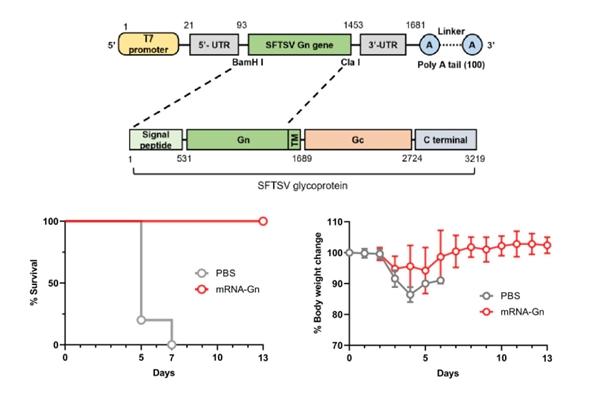-
Professor Nam Jaehwan's joint research team developed the first domestic mRNA vaccine against the virus transmitted by..Author : 관리자Date : 2023.11.06Hit : 388
-
- Effectively defends against the SFTS virus transmitted by ticks with a self-developed mRNA vaccine
- Commercially available to all, as both the gene expression and delivery systems were developed using domestic technology
- Published research findings in the prestigious international journal "npj Vaccines (IF=9.399)" in the vaccine field

*Image Description: An mRNA vaccine expressing the Gn protein of the SFTS virus transmitted by the killer tick was administered to experimental mice. After injecting the SFTS virus, mice not vaccinated died within a week, while vaccinated mice all survived with minimal weight loss.
The joint research team of Professor Nam Jaehwan from the Department of Biomedical Sciences at the Catholic University of Korea developed the first domestic mRNA vaccine against the SFTS virus (SFTSV), which causes Severe Fever with Thrombocytopenia Syndrome (SFTS) when bitten by the killer tick.
Severe Fever with Thrombocytopenia Syndrome (SFTS), which predominantly occurs during the increased outdoor activity period from March to November, is an infectious disease that develops when bitten by a tick known as the "killer tick" or Haemaphysalis longicornis. In Korea, 200 to 300 patients are reported annually with a high mortality rate of 10-30%, yet no treatment or preventive vaccine has been developed.
In response to this pressing issue, a dedicated research team led by Professor Nam Jaehwan from the Department of Biomedical Science at the Catholic University of Korea, renowned for their expertise in mRNA vaccine development for both prevention and treatment, joined forces with Professor Cho Namhyuk's team from the College of Medicine at Seoul National University to embark on developing an mRNA vaccine against SFTSV.
The joint research team removed the Tm part of the Gn structural gene of SFTSV and made it expressible in an mRNA vaccine. After administering two doses at two-week intervals, they confirmed the formation of neutralizing antibodies and T-cell activation. In experiments, all mice injected with the SFTS virus and not vaccinated died within a week, whereas vaccinated mice survived, showing minimal weight loss, thus confirming the vaccine's effectiveness.
The SFTSV mRNA vaccine developed from this research was created based on domestic technology owned by Professor Nam Jaehwan's research team at the Catholic University of Korea, encompassing both the gene expression system and delivery system. As a result, it can be commercially used by anyone without patent issues. The research, supported by the Ministry of Food and Drug Safety's "mRNA Vaccine Toxicity Evaluation Technology Development" project, was published in "npj Vaccines (IF=9.399)," a top-tier journal in the vaccine field and a sister journal of Nature.
Professor Nam's research team at the Catholic University of Korea stated, "It is significant that we have developed the first domestic mRNA vaccine against SFTS, and all the technologies used were self-developed domestically. We will continue our research to develop vaccines that can simultaneously defend against various pathogens commonly encountered during outdoor activities, including SFTSV." (End of Document)
-
Attachment File

